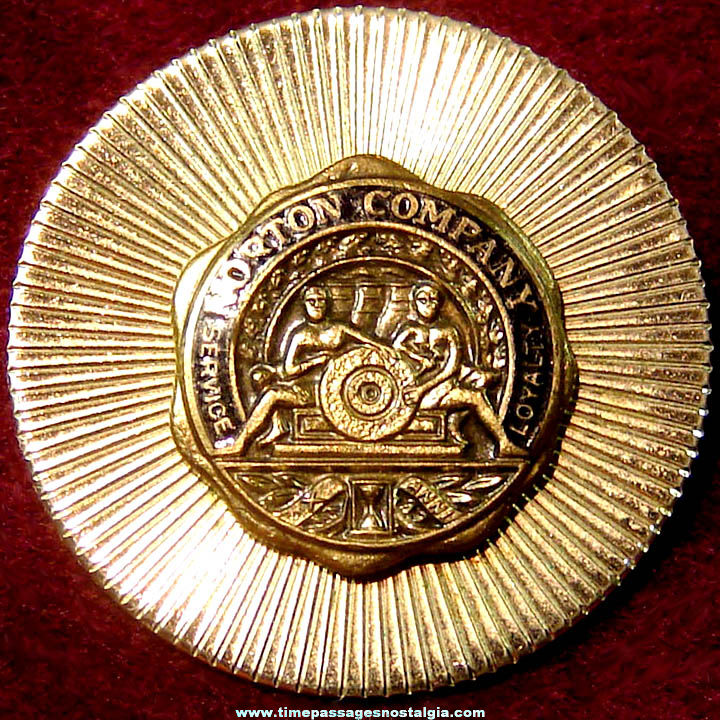
 | Item #m367 | 
Price: $19.99
$6 shipping & handling
For Sale
|
|
  | | | Any group of items being offered as a lot must be sold as a lot. | | You don't have to be an eight year old to enjoy having
a childhood treasure. | Quantity Discount Prices
(when available) | Quality Packing And
Postal Insurance | | Quality Merchandise At Reasonable Prices | It's never too late to
have a happy childhood! | Nostalgic Memorabilia, Pop Culture Artifacts, Historic Items,
and "Shoe Box Toys" |  | Great memories
make great gifts! |
| | | | The picture below shows a larger view of this Old Enameled Norton Company Advertising Employee Loyalty Service Pin. The employee pin is not dated but it is old. It is made of a silver colored metal. This is believed to be a ten year service loyalty pin. It has an emblem or logo in the center with two seated employees, one holding a hammer, holding a large grinding wheel. There are three smoke stacks in the background and an hour glass at the bottom. It is marked on the two sides as follows: NORTON COMPANY
SERVICE – LOYALTY
X ANNI The pin measures 1-1/8'' wide. It appears to be in mint condition as pictured. Below here, for reference, is some Norton Company information: Norton Abrasives
From Wikipedia, the free encyclopedia Type: Abrasives Manufacturing Company
Industry: Abrasives
Headquarters: Worcester, Massachusetts, United States
Products: Bonded Abrasives, Coated Abrasives, Non-Woven Abrasive Products, Superabrasives, Non-Abrasive Products
Parent: Saint Gobain Norton Abrasives of Worcester, Massachusetts, U.S.A. is the world's largest manufacturer and supplier of abrasives for commercial applications, household, and automotive refinishing usage. In 1990 it was purchased by Saint-Gobain of France. Norton specializes in the manufacture of abrasive products for applications in the autobody, construction, welding/industry, and marine / composite markets as well as for contractors and DIY consumers. Origins and History[edit]
Norton Company was founded in 1885 by a group of ceramists and entrepreneurs from Worcester, Massachusetts. The group set out to manufacture the first mass produced, precision made grinding wheel to fulfill the burgeoning U.S. manufacturing industry's growing need for abrasives.In 1886, employing the help of student surveyors from the Worcester Polytechnic Institute, the partners built a new factory on the outskirts of Worcester. The factory was not only important to the company for its innovation but also for its proximity to two major railways for shipping. During the late the 1890s, corporate decision making proved conservative until it was assured the company would succeed. Until that time, dividends were frequently forgone and many of the owners declined to draw a salary. Also pivotal to Norton's early growth was a focus on marketing. The company introduced a series of pamphlets and related literature, which detailed the intricacies of each wheel and advised users on benefits for desired applications. By the mid 1890s, Norton stocked the largest inventory of grinding wheels in the world, subsequently beginning distribution in Chicago (1887), New York City (1904), and soon after, across Europe. One of the largest keys to the growth of the company was Norton's 1900 expansion into the machine tools industry. Through partnership with Charles H. Norton, the company founded the Norton Grinding Company division. The company specialized in the production of stationary grinding machines, an alternative to expensive workmen, which were capable of producing high volume, working with extremely heavy materials, and grinding with an unbelievable tolerance. Initially, with minimal product need, Norton's Grinding division saw little success, but the American industrial needs of World War I and the American automobile industry boom began a period of explosive growth. In 1914, Henry Ford's purchase of thirty-five Norton Grinders prompted Ford to remark that “the abrasive processes are basically responsible for our ability to produce cars to sell for less than a thousand dollars. Were it not for these processes these same cars would cost at least five thousand dollars, if indeed they could be made at all.” With 95 percent of an automobile's moving parts requiring grinding, the automotive industry soon became Norton's biggest customer. With a resistance to grinding innovation, Norton gradually lost most of its industry market share by the mid 1950s. In 1931, Norton completed its first acquisition, when it purchased the Behr-Manning company of Watervliet, New York. This purchase added coated abrasives and sandpaper to Norton's line, which, going forward, would be two of Norton's more successful products. In the mid 1950s, with sales over $30 million, Behr-Manning was fully absorbed into Norton. Norton was also a leader in the design and building of grinding machines for mass production. Products
Norton's key areas of manufacture in the abrasives market are bonded abrasives, coated abrasives, non woven abrasives, superabrasives, and specialty non Abrasive products. Environmental Record
In 1988, Norton instituted an industrial recycling plan for which it has received a number of awards. Norton's retail abrasive products are packaged with 100% recycled materials containing 25% post consumer waste. Since 2009, Norton has been a chief sponsor and abrasive supplier for both the United States Men's and Women's Olympic luge teams. Both teams competed under Norton sponsorship in the 2010 Vancouver Winter Games. In 2009, Saint-Gobain was recognized with an Energy Star Partner of the Year award by the U.S. EPA as well as a Global 100 Sustainable Company designation by the World Economic Forum. In day to day operations, a number of Saint-Gobain Abrasive plants have completed or are in the process of completing ISO 9000 quality certification and use FSC paper from managed forests. |
|
Click on image to zoom.
 |